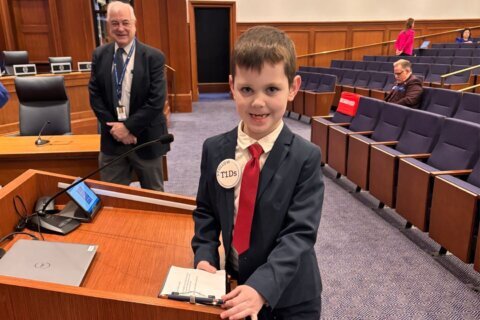This article was republished with permission from WTOP’s news partner InsideNoVa.com. Sign up for InsideNoVa.com’s free email subscription today.
This article was written by WTOP’s news partner InsideNoVa.com and republished with permission. Sign up for InsideNoVa.com’s free email subscription today.
Prince William County Executive Chris Shorter proposed major pay increases for county employees and a 5.3-cent real estate tax reduction Tuesday night, all part of his $1.61 billion budget proposal for the 2024 fiscal year.
County supervisors, meanwhile, are eyeing an even bigger real estate tax cut to go along with a tax hike on data centers beyond the increases scheduled through fiscal 2025.
Shorter’s proposed budget – his first since taking over the county executive role – would provide for market adjustment and step increases for all county employees totaling 9% for general government staffers, 9.8% for fire and rescue and sheriff’s employees and 7.2% for adult detention center employees. Police would see a 3% bump after the board voted in December for a 17.5% raise for police officers to start last month.
The county’s biggest fiscal 2024 expenditure would be its $787 million allocation to Prince William County Schools, a 10.1% increase from the current fiscal year and about $10 million more than the schools were anticipating when Superintendent LaTanya McDade introduced her proposed budget earlier this month. The county and schools have a longstanding revenue sharing agreement by which schools get 57.23% of the county’s revenue.
On real estate taxes, the board voted to advertise Shorter’s proposed rate of $0.977 per $100 of assessed value. The board can still decide to set that rate lower upon final adoption of the budget in April, but even with the rate reduction, the average residential bill would increase $49 due to rising assessments.
Data center tax
Much of Tuesday night’s discussion, though, centered around the business tax rate on computer equipment and other peripherals, which has become known as the “data center tax.” While the tax affects all businesses, its biggest remunerator is the county’s booming data center industry.
In 2021, the board voted on a schedule of gradual increases that moved the rate from $1.25 in 2019 to $1.65 in the current fiscal year. The plan was for the rate to continue increasing the rate annually until it reached $2 in fiscal 2025.
On Tuesday, though, the board’s three Republicans pushed even bigger increases to the tax as a means of keeping the average residential tax bill flat or even reducing the real estate tax burden on homeowners. Raising the computers tax to $2.12 would be enough to drop the real estate rate to 96.7 cents, keeping the average bill flat for homeowners.
“I think it’s time to talk about increasing it in a more aggressive manner,” Brentsville Supervisor Jeanine Lawson, who actually voted against the rate increases in 2021, said Tuesday. “Things have changed dramatically and honestly, as much as we might want to set a schedule … elected bodies change, circumstances change, business climates change. Everything is subject to change. So even though we can set a schedule for the next five years, that doesn’t mean it has to be followed.”
Ultimately, the board’s Republicans found some common ground with enough of the Democratic majority to move the advertised computer tax rate – which serves as a ceiling for the ultimate rate – from the proposed $1.80 to $2.15. Board Chair Ann Wheeler was one of three votes against increasing the advertised rate.
Wheeler said bucking the rate schedule the board adopted less than two years ago would jeopardize the county’s integrity with businesses in the future.
“It’s the integrity of our economic development people who have to go out and talk to other businesses,” Wheeler said. “I think it’s a little irresponsible to just start throwing around numbers … We had this discussion a few years ago, and we agreed to just give certainty to the industry and raise it every year.”
Pay bumps, staffing
The salary increases included in Shorter’s proposed spending plan are similar to those recommended by a consultant weeks ago as part of the county’s compensation study. To stay competitive with nearby jurisdictions in the region, the consultant said, firefighter pay would need to increase by 6.8%, sheriff’s employees would need a 7.8% raise and adult detention center workers would need 4.2%.
For the most part, the board offered little pushback on the raises, and Shorter said just the fact that he could suggest such dramatic increases was a step in the right direction.
“These are historic highs. I appreciate that I’m not getting … pushback on even proposing this,” Shorter told the board Tuesday. “So the fact that we are at this point where we could be proposing these kinds of increases for recognizing that our employees have gone without … I’m excited about.”
The budget proposal also includes new hires for plan review and inspection services to be paid for in future development and building fees, two additional transportation department staffers, four full-time workers for the county’s community safety initiative and the final year of planned staffing increases for Commonwealth’s Attorney Amy Ashworth’s office.
The county would also hire a new energy program manager to implement climate mitigation and resilience goals, as well as 13 new tax administration and procurement employees. Shorter said they’d ultimately pay for themselves.
“These are 13 new [full-time equivalent positions] … not supported by our general fund but instead supported by new revenue. And so we are projecting that these 13 FTEs will bring in additional revenue due to compliance and better enforcement,” he said.
Though the average real estate tax bill could ultimately be staying flat depending on how the board sets the final rate, several utility fees will likely be increasing in the coming fiscal year. Shorter’s spending plan includes stormwater management fee increases ranging from $2.57 to $3.42 depending on the type of dwelling and solid waste fee increases ranging from $3.19 to $5. The county’s solid waste fee, he said, hasn’t changed since it was adopted in 1998.
Shorter’s proposal is now the Board of County Supervisors’ to amend and approve. The board will hold three work sessions in March, a public hearing March 21 and a markup session April 18. The budget is scheduled for adoption at the April 25 supervisors meeting.







